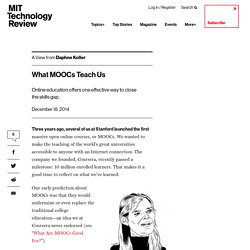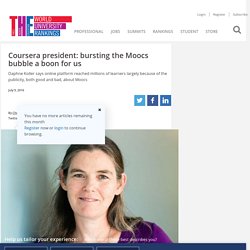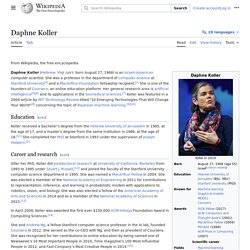

Daphne Koller Joins the Inaugural Group of Presidential Ambassadors for Global Entrepreneurship. What MOOCs Teach Us - MIT Technology Review. Online education offers one effective way to close the skills gap.

December 18, 2014 Three years ago, several of us at Stanford launched the first massive open online courses, or MOOCs. We wanted to make the teaching of the world’s great universities accessible to anyone with an Internet connection. The company we founded, Coursera, recently passed a milestone: 10 million enrolled learners. That makes it a good time to reflect on what we’ve learned. One early prediction about MOOCs was that they would undermine or even replace the traditional college education—an idea we at Coursera never endorsed (see “What Are MOOCs Good For?”). And it hasn’t happened—only 15 percent of our current learners are college age.
How do we create an educational experience suited to this very different population? We also need to find the right delivery method. Finally, we need to educate people on the value of this new type of credential. MOOCs Making Progress after the Hype Has Died. Daphne Koller - Cofounder, Coursera. Coursera president: bursting the Moocs bubble a boon for us.
Some academics enjoyed nothing more than seeing the “Moocs bubble” burst.

But it turns out that those who scoffed at massive open online courses may have unwittingly been playing into the hands of the innovation they were disparaging. Daphne Koller, president and co-founder of Coursera, told Times Higher Education that the hype around online courses and whether they would destroy traditional universities had been the biggest driver of student recruitment to her company, the world’s largest Mooc platform.
Professor Koller, the Rajeev Motwani professor of computer science at Stanford University, said that both the excitement around Moocs and the subsequent realisation that they would not be quite so transformative had been “largely overblown”. Instead, she argued, Coursera – which now has 20 million users and 145 course providers, including some of the world’s leading universities – was “making significant, steady progress in democratising access to education”. chris.havergal@tesglobal.com. Daphne Koller on the Future of Online Education - WSJ. Daphne Koller, Co-Founder Of Coursera. Daphne Koller Bids Farewell to Coursera, Hello to Calico.
Coursera co-founder Daphne Koller has ridden the MOOC craze as the company’s CEO and later president. Now Koller is returning to her background in machine-learning research. Yesterday, Koller announced she’s leaving the company to join Calico, a Google-funded research and development company that focuses on slowing aging and counteracting age‑related diseases.
“It is time for me to turn to another critical challenge—the development of machine learning and its application to improving human health,” Koller wrote in an Aug. 17 blog post. “This field has been a passion of mine since 2001, when I first started working on it at Stanford.” At Calico, Koller will serve as the company’s chief computing officer, leading teams developing new computational methods for analyzing biological data sets. Koller co-founded Coursera with machine-learning expert and fellow Stanford professor Andrew Ng in 2012. Daphne Koller: What we're learning from online education. Daphne Koller - Wikipedia. Daphne Koller (born August 27, 1968) is an Israeli-American Professor in the Department of Computer Science at Stanford University[1] and a MacArthur Fellowship recipient.

She is also one of the founders of Coursera, an online education platform. Her general research area is artificial intelligence[2][3] and its applications in the biomedical sciences.[4][5] Koller was featured in a 2004 article by MIT Technology Review titled "10 Emerging Technologies That Will Change Your World"[6] concerning the topic of Bayesian machine learning. Life[edit] She received a bachelor's degree from the Hebrew University of Jerusalem in 1985, at the age of 17, and a master's degree from the same institution in 1986.[7] Koller completed her Ph.D. at Stanford in 1993 under the supervision of Joseph Halpern, did postdoctoral research at University of California, Berkeley from 1993 to 1995,[8] and joined the faculty of the Stanford University Computer Science Department in 1995.
She is married to Dan Avida.[7]